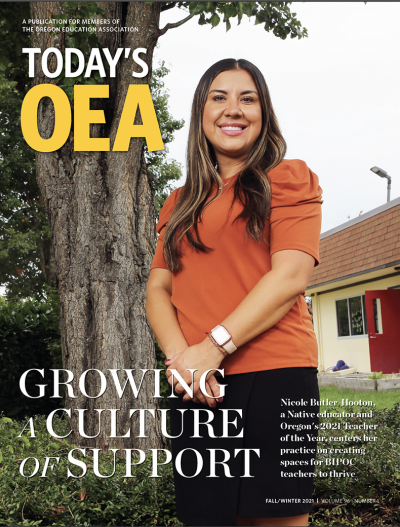OEA should join with other unions leading the campaign for an improved Medicare for All, single payer health care. Such a public health insurance funded by progressive taxes will deliver cost-effective, affordable, comprehensive care to every person living or working in Oregon regardless of health, income, age, or employment status. It would also protect high-quality public education from state budget strains caused by rising healthcare costs. This plan will improve public health, lower costs, improve Oregon’s economy, and protect workers from “Cadillac” taxes starting in 2020.
Medicare for All will directly benefit unions in bargaining struggles, will build union and working class power, and will advance union goals of social justice in health and healthcare. With lower administrative costs, the program will be more efficient than the current system, and allow for more choice of providers, without restriction to narrow networks. Our leadership in this social movement campaign will build solidarity and demonstrate the value of unions to all.
OEA and other unions already recognize the need to adopt universal, single-payer health care. Nationally, the campaign has been led by the National Nurses Union as well as the many unions in the coalition Labor Campaign for Single Payer. The American Federation of Labor and Congress of Industrial Organizations (AFL-CIO) supports Medicare for All in their Next Steps in Health Care Reform. The OEA is a coalition member of Health Care for All Oregon (HCAO), the state nonprofit leading this campaign, along with over a hundred organizations, including many other unions. In 2012 the OEA Representative Assembly reaffirmed this with a New Business Item in support of the efforts of HCAO.
The status quo is unsustainable. Looking at the overall trends, we see that rising healthcare costs and diminishing access threaten not only people’s health, but Oregon’s education funding and unions’ collective bargaining. It is well documented that our healthcare system, even after the Affordable Care Act (ACA), costs much more than universal systems in other countries while delivering worse health outcomes overall.
A 2014 study by Service Employees International Union (SEIU)/Act for a Healthy Oregon in Lane County showed the biggest cause of bankruptcy was medical debt, despite Oregon being a model for ACA reforms. In 2017, data from Bankrate showed that nearly 6/10 of Americans don’t have $500 to $1,000 saved for unplanned expenses. This is troubling because, even after the ACA, there’s been continued rise in substandard high-deductible insurance.
The United States has the highest healthcare costs in the world by far. They total just under 18 percent of gross domestic product. Switzerland is second at 12 percent. Even billionaire Warren Buffett has supported single payer for years, and recently Berkshire Hathaway Vice Chairman Charlie Munger, a Republican, joined him in pointing out how the cost of health care makes it difficult for U.S. companies to compete internationally. It’s one of the reasons why GM, Ford and Chrysler have shifted half their production from Detroit to Canada.
We can win state single-payer in Oregon. While national reform is the ultimate goal, as with progressive reforms like marriage equality and cannabis decriminalization, it’s strategic to win state campaigns. With a population comparable to those of Scandinavian countries, Oregon can reform health care.
After the recent election, there has been a surge of momentum for single payer in both the California and New York legislatures. Historically, Canada’s single payer system, called Medicare, was won in a single province in a difficult political battle, but then spread across provinces as a national system because it worked so well.
Medicare for All would directly benefit unions in bargaining struggles. Private health insurance premiums continue to rise faster than inflation and our salaries. Bargaining pressure to give on health care premium “cost sharing” will grow ever more intense. Holding the line on health benefits will make it harder to make or defend bargaining gains on wages/salaries, working conditions, retirement, and other matters. Pressure will increase to hollow out covered benefits, increase deductibles and co-pays and to drop family plans. A universal public health insurance would protect health care benefits from being bargained away.
6 out of 10 Americans don't have $500 or $1,000 saved for unplanned expenses on a daily basis according to 2017 data from Bankrate.
Medicare for All would build union and working class power and will advance union goals of social justice in health and healthcare. Shifting the unions’ strategy to public provision of health care for all would help to undercut the false attacks on unions as promoters of privilege for only its members. When we stand at the head of this movement, we are recognized as builders of social solidarity. Everybody in, nobody out. Now more than ever, that solidarity is crucial to fight together against future attacks on unions, public sector workers, and educators.
Residents of nations with universal healthcare systems are healthier, as we see from international data. When Oregonians are healthier, students, educators and their families will also be healthier. Education outcomes will improve, and absenteeism will be reduced.
Medicare for All would improve the economy and employment rates while reducing strain on public budgets. The Affordable Care Act has resulted in the problem of employers shifting workers from full-time to part-time status to save on healthcare obligations. Lower health insurance cost frees resources to increase the pay of all Oregonians and reduce inequality and poverty. For educators, the promise that they will not lose access to healthcare means that more of those at the top of the salary scale can retire early, opening jobs for younger educators.
With Medicare for All, employers large and small will be able more freely to hire workers without worrying about the cost of health benefits. Oregon would gain a competitive advantage, attracting investment to the state, without giving away millions in tax subsidies to attract or keep business development in our state. Many American multinational companies already see that benefit when they do business in other countries, just as our own members see the benefits of better health care systems when they visit friends or family members living in other countries.
Solidarity is the antidote to hate and fear. Another world is not only possible, with universal health care, it actually exists just over our border and in many other countries. An improved, universal, and publicly-funded healthcare can be one form of solidarity.
We can do this, but we will need your active involvement. Join our movement! You can sign HCAO’s statement of support, as well as become an individual member of HCAO. At your local and in your community, you can also host a showing of the Healthcare Movie or Fix It, and invite a guest speaker from HCAO.
Visit www.hcao.org/mss to learn more and get involved!
About the Author:
Hyung Nam has taught high school social studies for Portland Public Schools since 2000 and has been active with Portland Association of Teachers. He also serves as a board member of Health Care for All Oregon and helps to organize the NW Teaching for Social Justice Conference.

